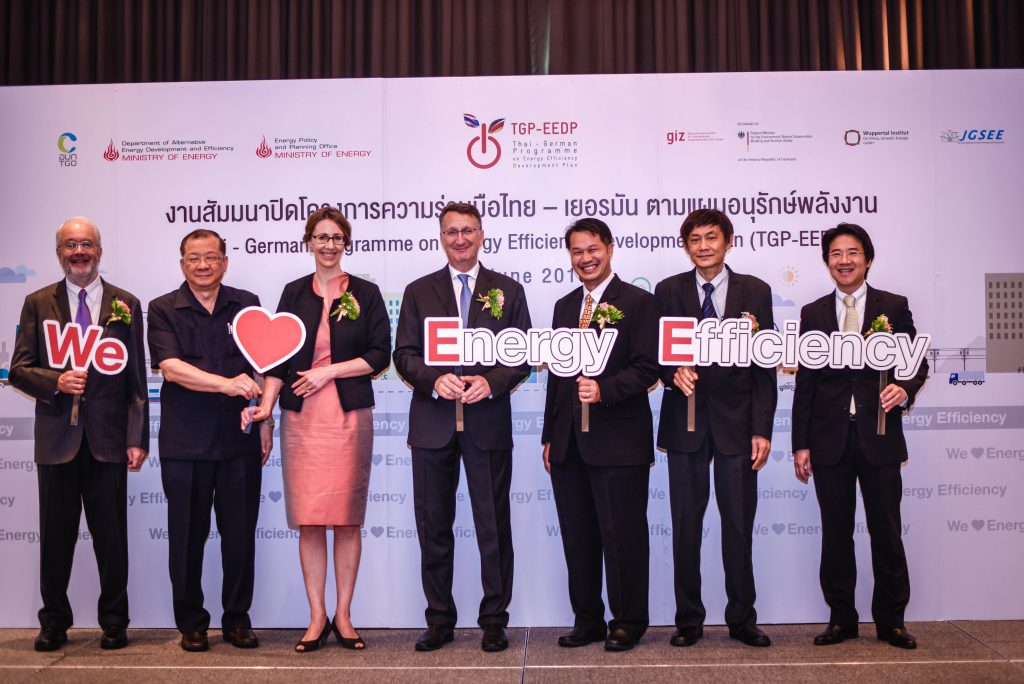(From left)
Dr. David Crossley, the Regulatory Assistance Project, Australia
Prof. Dr. Praipol Koomsup, Energy Expert
Dr. Milou Beerepoot, Project Director, the Deutsche Gesellschaft für Internationale Zusammenarbeit (GIZ) GmbH
H.E. Mr. Peter Prügel, Ambassador, Embassy of the Federal Republic of Germany in Thailand
Dr. Twarath Sutabutr, Director-General, the Energy Policy and Planning Office (EPPO)
Mr. Danai Egkamol, Deputy Director General, the Department of Alternative Energy Development and Efficiency (DEDE) and
Mr. Photjanart Sangpruaksa, First Senior Vice President, KBANK
At the closing ceremony of Thai- German Programme on Energy Efficiency Development Plan (TGP-EEDP). Under the TGP-EEDP, the Deutsche Gesellschaft für Internationale Zusammenarbeit (GIZ) GmbH – is cooperating with the Energy Policy and Planning Office (EPPO) under the Thai Ministry of Energy, to contribute to the further development and support the implementation of Thailand’s Energy Efficiency Plan (EEDP 2011-2030 and EEP, 2015-2036). The TGP-EEDP project aims at promoting the increase of energy efficiency in industry and building sectors to create a direct impact on CO2 emission reduction.
———————————————————————————–
Project Overview
Under the Thai-German Programme on Energy Efficiency Development Plan (TGP-EEDP), the Deutsche Gesellschaft für Internationale Zusammenarbeit GmbH – GIZ – is cooperating with the Energy Policy and Planning Office (EPPO) under the Thai Ministry of Energy, to contribute to the further development and support the implementation of Thailand’s Energy Efficiency Plan (EEDP 2011-2030 and EEP, 2015-2036). The project is funded through the International Climate Initiative (ICI) Fund of the German Federal Ministry for Environment, Nature Conservation, Building and Nuclear Safety. The TGP-EEDP project aims at promoting the increase of energy efficiency in industry and building sectors to create a direct impact on CO2 emission reduction.
Since the TGP-EEDP started in May 2013, it supported Thailand’s Energy Efficiency Plan in four main activities: (1) energy baseline and data management; (2) mandatory approaches to energy efficiency; (3) energy efficiency incentive instruments; and (4) integration of energy efficiency and climate policy. More in general, the programme contributed to international knowledge transfer and capacity building on energy efficiency for a diverse range of Thai stakeholders.
Objectives of the EERS Seminar
- To disseminate the results of the TGP-EEDP project
- To create a platform for exchanging experiences between Thailand and foreign countries on energy efficiency
The morning session was honored by having H.E.Mr. Peter Prügel, German ambassador to Thailand to open the seminar together with Dr. Twarath Sutabutr, Director General of Energy Policy and Planning Office. In addition, there was a discussion on the topic ‘Scaling up investments in EE projects through market mechanisms’ by experienced panelists from government sector, university, bank and international practice.
The afternoon session was divided into 4 rooms for 4 topics. Each session provided interesting presentation and panel discussion for people who interested.
Document and Presentation for download
1. Agenda Thai and English
2. Milou Beerepoot: Overview of TGP-EEDP, project goal, objectives and main activities.
Conference session
ESCO business and Thailand’s energy efficiency
1. GIZ: Enhancing the Capacity of ESCO
2. PEA: ESCO Implementation in Government Sector
3. Team Precision Public Company Limited: ESCO Facilitation Approach
Energy data for monitoring and evaluation (M&E)
1. Orathai Chaisinboon: Energy Efficiency Indicators (EEI)
2. Dr. Bruno Lapillone: Energy Efficiency Monitoring
Business opportunities on high energy efficient building
1. Dr.-Ing. Robert Himmler: Success factors of high energy efficient buildings in Germany
2. Karun Pantong: TGP-EEDP work on Building Energy Efficiency
Roles of utilities on energy efficiency
1. Dr. David Crossley: International Experience with Utilities and Energy Efficiency
2. Pan Piyasil: Roles of Utilities on Energy Efficiency
